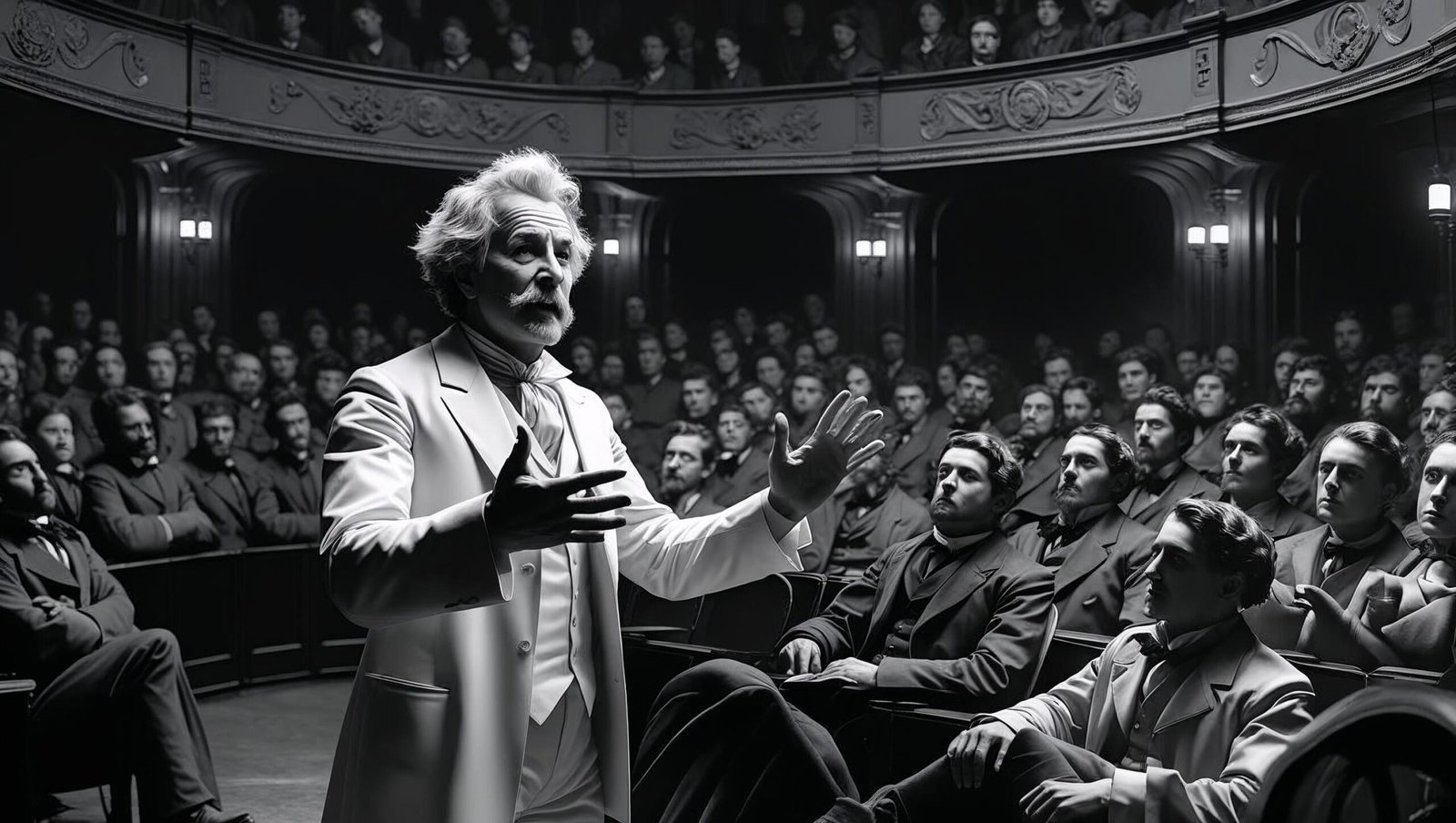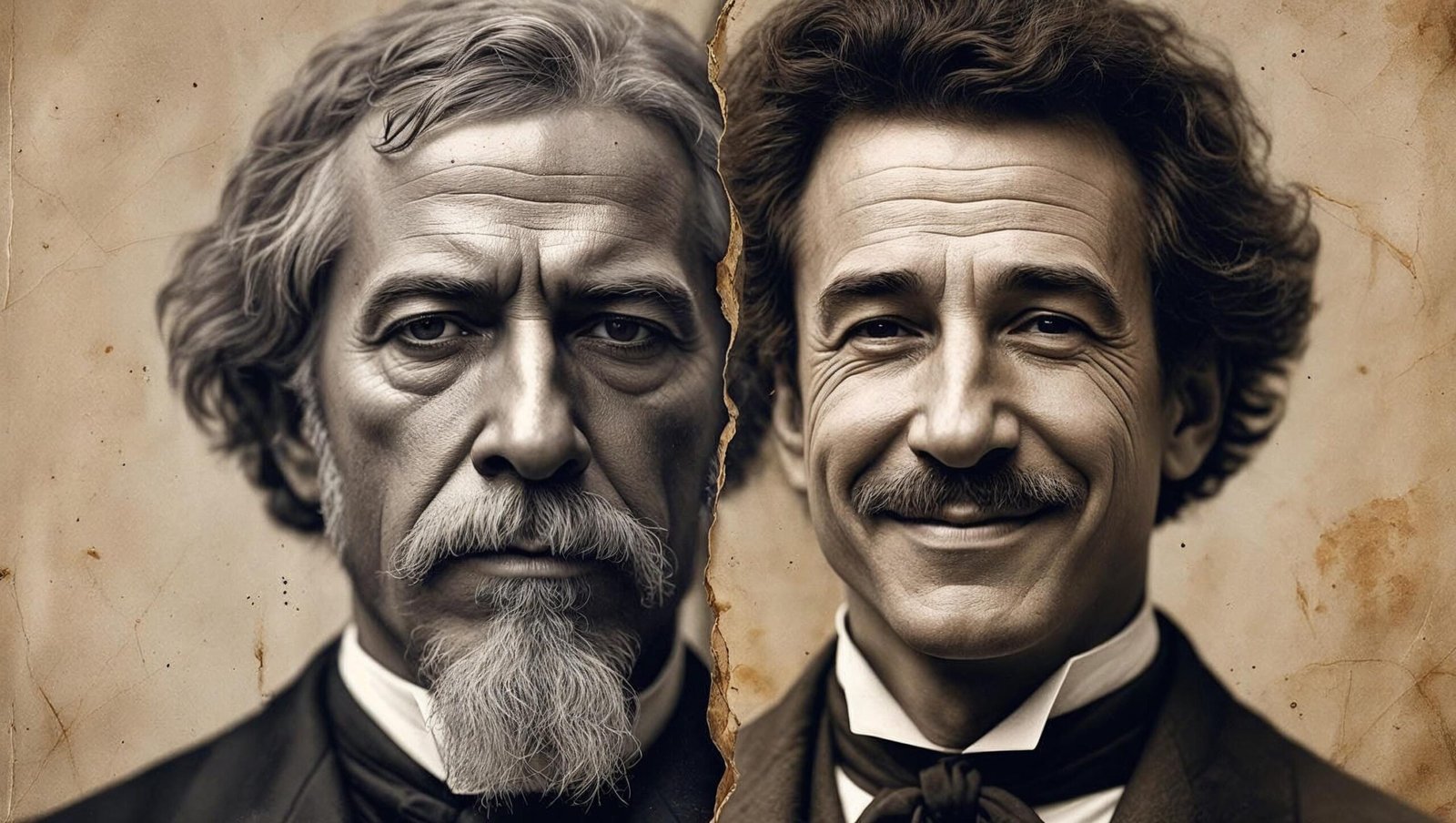Introduction: A Legendary Life Reimagined
Mark Twain by Ron Chernow stands as a masterstroke in modern biography. It doesn’t just recount the timeline of an iconic American writer; it reanimates the soul of Samuel Langhorne Clemens—commonly known as Mark Twain—through meticulous research and psychological depth. With this book, Ron Chernow redefines how we should remember one of America’s most complex literary figures.
Known for his Pulitzer Prize-winning works on Hamilton, Rockefeller, and Grant, Chernow now turns his unmatched biographical lens toward Twain. The result is a sweeping, unflinching narrative that captures Twain’s brilliance, contradictions, and tragic charm.

1. Mark Twain by Ron Chernow Begins with the Boy Called Sam
Mark Twain by Ron Chernow introduces readers to the young Samuel Clemens growing up in the racially tense town of Hannibal, Missouri. Chernow paints a vivid picture of Twain’s boyhood—his early exposure to slavery, hardship, and death—all of which would eventually influence his iconic novels.
Twain’s moral complexity is no accident. Chernow shows how these formative experiences forged a worldview that was simultaneously progressive and paradoxical, shaped by guilt, fear, and curiosity.
2. The Transformation into Twain
What truly distinguishes Mark Twain by Ron Chernow is the detailed chronicle of Clemens’ metamorphosis into the persona of Mark Twain. Chernow explains how this identity wasn’t just a pen name—it was a carefully cultivated character, forged on Mississippi riverboats, in Nevada mines, and on global lecture circuits.
The author shows that Twain’s transformation was more than professional—it was existential. Twain wore his wit like armor, shielding the wounds of a fractured identity and an often tormented soul.
3. Twain’s Writings Revisited and Reassessed
Ron Chernow refuses to idolize. In Mark Twain by Ron Chernow, even the sacred texts of American literature are subjected to rigorous scrutiny. Chernow unearths the societal critiques within The Adventures of Huckleberry Finn, The Prince and the Pauper, and A Connecticut Yankee in King Arthur’s Court.
Rather than celebrating Twain’s humor, Chernow focuses on his rage: at institutionalized racism, imperialism, religious hypocrisy, and the dark underbelly of capitalism. These weren’t just entertaining books—they were instruments of cultural defiance.
4. Business Blunders and Public Disgrace
The biography spares no detail in documenting Twain’s financial naiveté. Mark Twain by Ron Chernow turns his investment in the Paige typesetter and other ventures into a cautionary tale. His bankruptcy and subsequent global lecture tour to repay creditors are chronicled with precision and pathos.
Chernow connects Twain’s financial blunders not to incompetence, but to his irrepressible optimism and blind trust—traits that made him both beloved and vulnerable.
5. Olivia Langdon: Partner, Editor, Anchor
Twain’s relationship with his wife Olivia is portrayed in touching, sometimes heart-wrenching detail. In Mark Twain by Ron Chernow, Olivia is not relegated to the margins. She is shown as Twain’s moral compass, editorial partner, and intellectual counterpart.
Yet, Chernow doesn’t idealize. Their marriage, though affectionate, was marked by tensions—intellectual, religious, and emotional. Olivia’s influence on Twain’s writing was profound but often underappreciated, a wrong Chernow decisively corrects.
6. The Tragedy of the Twain Family
Personal grief courses through Mark Twain by Ron Chernow like an undertow. The deaths of Twain’s children—particularly Susy and Jean—shattered him. These devastating losses are not glossed over but unpacked to reveal how they permanently altered Twain’s worldview.
Chernow offers haunting insights into how grief shaped Twain’s later works, pushing them into darker, more cynical territory. The Mysterious Stranger emerges not as an anomaly but a reflection of a father broken by life.

7. A Fierce Critic of Empire and Hypocrisy
The biography explores Twain’s late-life political awakening. Mark Twain by Ron Chernow presents a scathing account of his anti-imperialist stance, his rebuke of American colonization in the Philippines, and his criticism of religious orthodoxy.
Chernow highlights Twain’s moral clarity in an age of ambiguity. While many of his contemporaries remained silent, Twain used his voice—and pen—as weapons against injustice. In doing so, he became both prophet and pariah.
8. A Citizen of the World
Chernow dedicates significant pages to Twain’s travels, showing how international exposure widened his moral and philosophical lens. Mark Twain by Ron Chernow documents Twain’s journeys through Europe, India, Palestine, and Asia not as tourist ventures but as transformative pilgrimages.
These travels challenged Twain’s assumptions, inspired essays, and informed his later writing. Chernow convincingly argues that Twain’s global outlook made him a truly international figure.
9. The Showman: Twain on Stage
Mark Twain by Ron Chernow also revives the memory of Twain the performer. His lectures were theatrical marvels—blending humor, irony, and biting commentary. Chernow sees these performances not as sideshows but as integral to Twain’s identity.
Twain understood the power of spectacle long before the age of Instagram. Chernow places him among the earliest masters of personal branding—a man who knew how to own a room and a reputation.
10. Legacy through a Modern Lens
Ron Chernow makes the case that Twain’s relevance is not historical—it’s enduring. Mark Twain by Ron Chernow posits that Twain’s critiques of nationalism, religious hypocrisy, and social injustice are more vital than ever.
The book challenges readers to engage with Twain not as a nostalgic figure but as a radical thinker whose humor was rooted in discomfort and whose writing was often revolutionary in intent.
11. A Biography Worthy of Its Subject
Ultimately, Mark Twain by Ron Chernow is not just a book about Twain—it is Twain, revisited. It captures his contradictions, passions, failures, and genius in a way that no previous biography has.
Chernow writes with authority and compassion, never afraid to criticize but always eager to understand. The result is a book that feels definitive, a literary monument to an American colossus.
Further Reflections on the Literary Force of Nature
What distinguishes Mark Twain by Ron Chernow from other biographical attempts is not merely the depth of factual accuracy or narrative flair—it is the moral scrutiny and literary reverence that underpin every chapter. Ron Chernow isn’t just chronicling a life; he’s interpreting a legacy. Through this prism, Twain emerges not as a distant historical figure, but as a voice echoing across generations, challenging norms, dismantling pretense, and questioning every authority that lacked compassion or authenticity.

The Mask of Humour: Satire as Sword and Shield
One of the most powerful observations within Mark Twain by Ron Chernow is the role of satire in Twain’s arsenal. Chernow asserts that Twain’s humor wasn’t an escape from reality, but a counterattack against it. When Twain mocked society’s elites, religious institutions, or the vapid conventions of the day, he was, in essence, demanding reform cloaked in laughter.
Unlike many comic writers who use humor as a buffer, Twain wielded it like a scalpel. In the biography, Chernow documents numerous public speeches, interviews, and private letters in which Twain’s wit revealed deeply held convictions. What might appear as a passing jest was often a pointed commentary on injustice, exploitation, or human folly.
Twain’s Relationship with America: Love-Hate or Tough Love?
Chernow’s exploration in Mark Twain by Ron Chernow of Twain’s relationship with the United States is particularly fascinating. While Twain became America’s first global celebrity, he remained an incisive critic of its faults. He loved the country’s people, its stories, and its promises—but he often despaired at its moral failings.
From the corruption of the Gilded Age to the horrors of slavery, Twain saw in his homeland both paradise and perdition. Chernow presents Twain not as a cynic but as a disappointed idealist—a man whose critique came from a place of deep yearning for a better, more honest republic. This tension is what made Twain’s voice so powerful and enduring.
The Linguistic Innovator
One of the underappreciated aspects of Twain’s genius, as detailed in Mark Twain by Ron Chernow, is his revolutionary use of language. Twain was among the first American authors to elevate vernacular speech into literary form. The dialogue in The Adventures of Huckleberry Finn—often imitated but never equalled—helped dismantle the British affectation that had dominated American prose.
Chernow meticulously traces Twain’s linguistic choices, showing how his ear for regional idioms was both authentic and radical. Twain’s commitment to reproducing American speech patterns brought voices to literature that had never been represented before. In doing so, he democratised the novel and gave it a uniquely American soul.
Twain’s Women: Complexities of Gender and Partnership
While much has been written about Mark Twain’s male friendships and professional connections, Mark Twain by Ron Chernow pays overdue attention to the women who shaped and challenged his worldview. Olivia Langdon, Susy Clemens, and even female contemporaries like Harriet Beecher Stowe are afforded nuanced representation.
Olivia, in particular, is cast as more than Twain’s wife—she was a force of moral grounding and literary discernment. Chernow argues that without her influence, Twain’s voice might have veered into cruelty or chaos. Her refinement tempered his fire; her feedback sharpened his satire. Twain’s letters to Olivia, filled with equal parts passion and penitence, reveal a man deeply reliant on her emotional compass.
The Twain Household: Sanctuary or Pressure Cooker?
Chernow uses unpublished diaries, servant testimonies, and personal correspondence to depict Twain’s household as a complex ecosystem. In Mark Twain by Ron Chernow, the Clemens home is not merely a domestic setting—it is the crucible where Twain’s public brilliance clashed with private tension.
Twain was often moody, melancholic, and irritable. He struggled with his daughters’ independence, Olivia’s chronic illnesses, and the expectations placed upon him as a global figure. The juxtaposition between Twain the jester and Twain the brooding patriarch adds poignant depth to Chernow’s portrayal.

Religion and Righteous Rage
Religion, for Twain, was a battleground. He could recite the Bible better than many clergymen and had a reverence for the spiritual, yet he was openly antagonistic toward organized religion. In Mark Twain by Ron Chernow, Chernow unpacks Twain’s theological contradictions: the man who prayed sincerely, yet excoriated missionaries for their complicity in colonial crimes.
His essay “The War Prayer,” which satirizes blind patriotism and religious fervor, is perhaps Twain’s most eloquent condemnation of moral hypocrisy. Chernow places such works in context—not as isolated moments of rebellion, but as philosophical throughlines in Twain’s entire life.
Race: An Evolving Conscience
Perhaps the most compelling chapter in Mark Twain by Ron Chernow deals with Twain’s views on race. Raised in a slaveholding society, Twain initially internalized many of the racial biases of his era. However, Chernow tracks a remarkable evolution—from passive acceptance to vocal condemnation of racism.
Twain’s friendship with African American figures like Frederick Douglass, his financial support for the education of Black students, and his unapologetic denunciation of lynching all signal a man whose conscience matured painfully but genuinely. Chernow resists simplistic hero worship, choosing instead to highlight the process of transformation—a rare biographical honesty.
The Irony of Immortality
Toward the end of Mark Twain by Ron Chernow, Chernow reflects on Twain’s enduring fame and the ironies it entails. Twain, who once worried that his best work was behind him, became more famous in death than in life. His image, voice, and wit are endlessly quoted—sometimes in ways that would have made him laugh, other times cringe.
Chernow invites readers to consider what Twain might think of the modern era: the culture wars, the commodification of outrage, the weaponization of humor. Would Twain be canceled today? Or would he thrive as the voice of reason in a world gone mad?
What is clear is that Mark Twain by Ron Chernow isn’t just a biography. It’s a mirror held up to America—and, perhaps, to ourselves.
The Craft of Biography: Chernow’s Signature Touch
Any review of Mark Twain by Ron Chernow would be incomplete without acknowledging the author’s literary craftsmanship. Chernow blends the rigors of academic scholarship with the elegance of storytelling. His prose is measured, deliberate, and often moving.
He allows Twain to speak when necessary, drawing extensively from letters and diaries, but never cedes narrative control. His analysis is never heavy-handed, his judgments always informed by empathy. In many ways, Chernow’s own voice mirrors Twain’s—intellectual, ironic, but deeply humane.
Final Thoughts: Twain’s Voice is Still With Us
As one closes the pages of Mark Twain by Ron Chernow, it becomes apparent that this book is not about the past—it is a conversation with the present. Twain’s sharpest observations feel eerily applicable to today’s moral dilemmas. His critiques of nationalism, his defense of free speech, his disdain for moral hypocrisy—these are not relics but guiding lights.
This biography reclaims Twain from souvenir shops and high school syllabi and places him where he belongs: in the pantheon of thinkers whose work compels us to think, question, and feel.

Why This Biography Matters Beyond the Page
The enduring relevance of great literature lies not only in its historical significance but in its ability to provoke thought and stir conscience. Biographies like this do more than recount events—they awaken perspectives long buried under modern distractions. They remind us that behind every celebrated name lies a journey filled with doubt, failure, resilience, and redemption. For any reader seeking more than surface-level storytelling, such works offer an invitation to explore the depths of human experience. They compel us to reflect on our own contradictions, aspirations, and the silent questions we carry throughout life. That, in itself, is transformative reading.
Frequently Asked Questions (FAQs)
Q1. What makes Mark Twain by Ron Chernow different from other Twain biographies?
A1. Chernow provides psychological depth and historical context, portraying Twain as both flawed and visionary, rather than merely a humorist.
Q2. Is Mark Twain by Ron Chernow suitable for readers new to Twain’s work?
A2. Yes, it offers a comprehensive yet accessible view of Twain’s life, making it ideal for both newcomers and seasoned readers.
Q3. How does Chernow approach Twain’s controversial views?
A3. He examines them with nuance, acknowledging Twain’s evolution and contradictions without glorifying or condemning.
Q4. Is there any focus on Twain’s relationship with race and slavery?
A4. Absolutely. Chernow explores Twain’s upbringing in the racially charged South and how it shaped his complex views on race and justice.
Q5. Why is this biography important today?
A5. Twain’s voice against injustice, empire, and hypocrisy resonates powerfully in today’s polarized world. This biography revives his relevance.
Conclusion: A Monumental Biography of a Monumental Man
Mark Twain by Ron Chernow is the literary equivalent of striking gold. It honors the complexities, failures, and genius of a man too often reduced to caricature. In Chernow’s skilled hands, Twain becomes not just a man of letters, but a man of fire, struggle, and transformation.
This book is not a stroll down literary memory lane—it’s a vivid, often uncomfortable, deep-dive into the life of a man who refused to conform. Whether you’re a fan of biography, American history, or literature, Mark Twain by Ron Chernow is an essential, unforgettable read.
For more in-depth book reviews and intellectual explorations, visit shubhanshuinsights.com
A platform committed to literary integrity and thoughtful commentary.